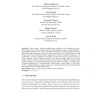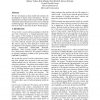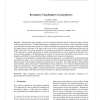JUCS
2006
15 years 2 months ago
2006
Abstract: Most modern computer applications should run on heterogeneous platforms and, moreover, objects and respective code should be easily interchangeable between distinct platf...
119
click to vote
LMO
1996
15 years 3 months ago
1996
We seek to support the development of open, distributed applications from patible software abstractions. In order to rigorously specify these abstractions, we are elaborating a for...
133
click to vote
WSC
2000
15 years 3 months ago
2000
This paper describes an object-orientated simulation approach towards an integrated planning of production systems. The main obstacle for an integrated use of simulation over diff...
109
click to vote
COOTS
1998
15 years 3 months ago
1998
We have developed an object model that facilitates the development of shared virtual environments. We have implemented our object model on top of COM and OLE Automation and facili...
133
click to vote
DAGSTUHL
2001
15 years 3 months ago
2001
In this paper we present a recursion-theoretic denotational semantics for Featherweight Java. Our interpretation is based on a formalization of the object model of Castagna, Ghelli...
129
click to vote
SIGSAND
2008
15 years 3 months ago
2008
Abstract: A closer look at typical information systems shows that relatively simple routines often contribute significantly to the overall expenses of the software development proc...
125
click to vote
ICCV
1995
IEEE
15 years 5 months ago
1995
IEEE
A new information-theoretic approach is presented for finding the pose of an object in an image. The technique does not require information about the surface properties of the ob...
136
click to vote
ICCV
1995
IEEE
15 years 5 months ago
1995
IEEE
Recognition systems attempt to recover information about the identity of observed objects and their location in the environment. A fundamental problem in recognition is pose estima...
118
click to vote
OOIS
2000
Springer
15 years 5 months ago
2000
Springer
When we model a phenomenon we apply a perspective on the phenomenon. The perspective decides which properties we include in the model. It also decides how we conceive a phenomenon ...
119
click to vote
DAGM
2006
Springer
15 years 5 months ago
2006
Springer
Abstract. We present a method for 3D object modeling and recognition which is robust to scale and illumination changes, and to viewpoint variations. The object model is derived fro...



